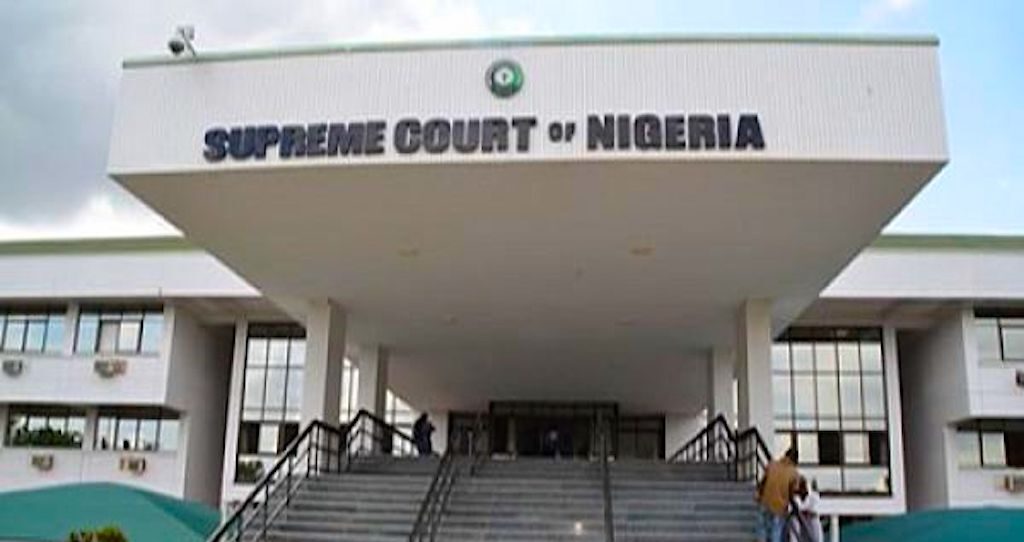 The Supreme Court, on Friday, voided the National Lottery Act 2005.
The Supreme Court, on Friday, voided the National Lottery Act 2005.
A seven-member panel of the court led by Uwani Abba-Aji unanimously held that the law is unconstitutional because the National Assembly lacks the power to make such laws for states.
Delivering the lead judgement, a member of the panel, Mohammed Idris, ruled that the National Assembly, by virtue of constitutional provisions, lacks the powers to legislate on issues relating to lottery and games of chance.
Therefore, the court ordered that the National Lottery Act 2005 should no longer apply in any state of the federation, Channels Television reported.
The court held that the National Assembly can only make such law for the Federal Capital Territory (FCT), which it has the powers to legislate for.
The court delivered the judgement on an appeal filed by all 36 state governments, in a legal tussle with the federal government which the Lagos State Government single handedly commenced in 2008.
The respondents to the suit are the Attorney-General of the Federation and the National Assembly as the second defendant.
The central issue in the case was determining whether the gaming and lottery sector falls under the Exclusive Legislative List, the Concurrent Legislative List, or the Residual Legislative List of the Nigerian constitution. The Exclusive Legislative List is reserved solely for the National Assembly, the Concurrent Legislative List includes matters that both the National Assembly and state Houses of Assembly can legislate on, while the Residual Legislative List covers issues exclusively within the jurisdiction of the state Houses of Assembly.
Laying the 15-year-old legal dispute to rest in its judgement on Friday, the Supreme Court held that only the state Houses of Assembly have exclusive jurisdiction over lottery and related issues, thereby placing the issue under the residual list.
It resolved the two focal issues raised for determination in the suit against the two respondents and granted all the state governments’ prayers.
It declared that “lottery or games of chance” is not an item on the Exclusive Legislative List of the constitution, which the National Assembly would have had an exclusive jurisdiction to legislate on.
It, therefore, held that, based on the provision of section 4(4)(a) & (b) and Part 2 of the Second Schedule of the constitution, matters relating to lottery are not issues on which the National Assembly and state Houses of Assembly have concurrent powers to make laws about.
The court declared that based on section 4(7)(a) and (c) of the First Schedule to the constitution the House of Assembly of Lagos State and other states have the powers, to the exclusion of the National Assembly, to make laws for the regulation and control of lottery within their states.
In particular, the court declared that sections 17, 18, 19 and 20 and 21 of the National Lottery Act 2005 are inconsistent with the constitution, adding that the National Lottery Act is inconsistent with the provisions of the Nigerian constitution.
The Supreme Court then issued an order nullifying the entirety of the National Lottery Act.
It also issued an order of perpetual injunction restraining the first defendant (AGF) and his agents and agencies of the federal government from implementing the provisions of the National Lottery Act within the territories of the plaintiff’s states.
The court further issued an order of perpetual injunction restraining the AGF, his agents or agencies of the federal government from continuing to implement or enforce the provisions of the National Lottery Act within the territories of the states.
It is still uncertain if the National Assembly will need to pass a new law to regulate the gaming and lottery sector in Abuja, following Friday’s ruling that invalidated the existing law and restricted the legislature’s authority over the sector to the federal capital only.
Apart from Mr Idris and the presiding justice, Ms Abba-Aji, the rest members of the panel are Mohammed Lawal Garba, Emmanuel Agim, Simon Tsammani, Stephen Adah and Jamilu Tukur. All the members of the panel agreed with the judgement.
The Attorney General of Lagos State commenced the suit at the Supreme Court in 2008, following disputes with the federal government over the control and regulation of the gaming and lottery sector.
On 6 October 2020, the Supreme Court granted Ekiti State’s request to join the suit as co State initially sought to join as a co-plaintiff but later withdrew its application.
Subsequently, the rest 34 states of the federation joined as defendants by an order of the Supreme Court on 15 November 2022.
The plaintiffs had asked the Supreme Court to declare that the lottery is not one of the 68 items on the Exclusive Legislative List, about which the National Assembly has the exclusive powers to make laws.
They also sought a declaration that the National Assembly lacked the power to legally and constitutionally make any law to regulate and control the operation of lottery in Nigeria.
Prior to Friday’s final decision of the Supreme Court, the disputes over the regulation of the gaming and lottery sector had thrown up two separate suits leading to conflicting decisions.
The Bookmakers Association of Nigeria had filed a suit asking the Federal High Court in Lagos to determine the legitimate regulators of gaming businesses, in hopes that it would streamline the multiple taxes and licensing fees paid to states and the federal government.
In the court’s judgement on the suit No FHC/L/CS/15992020 delivered on 19 July 2023, the judge, Iniekenimi Oweibo ruled that the federal government should be the sole regulator of the gaming business, saying the Constitution as putting lottery in the exclusive list. The judge said only the National Assembly can legislate on lottery matters.
The judgement did not end the back-and-forth on the issue.
Some months later the Lagos State High Court ruled in a judgment that matters of lottery and one-chance betting were subjects under the residual list in the constitution and affirmed that the matter was under the legislative and regulatory powers of Lagos State.
While battle continued at the High Courts, a suit by the Lagos State marked SC/1/2008 was pending at the Supreme Court.
The Lagos State, later joined by Ekiti State as co-plaintiffs, urged the Supreme Court to declare that lottery was not one of the 68 items on the Exclusive Legislative List captured under Part 1 of the Second Schedule of the Nigerian constitution over which the National Assembly has exclusive power to legislate on.
The suit sought by virtue of sections 4(4)(b), (7)(a) and 299(a) of the Nigerian constitution, the power of the National Assembly to make laws to regulate and control the operation of lottery is limited by the 1999 Constitution to only the Federal Capital Territory.
The plaintiffs sought a declaration that sections 17, 18, 19, 20 and 21 of the National Lottery Act CAP N145, Laws of the Federation of Nigeria, made by the National Assembly, are inconsistent with the provisions of the constitution.
The Supreme Court granted all of the plaintiffs’ prayers on Friday, placing the matter of lottery and gaming under the residual list of the constitution.
– Premium Times

Comments